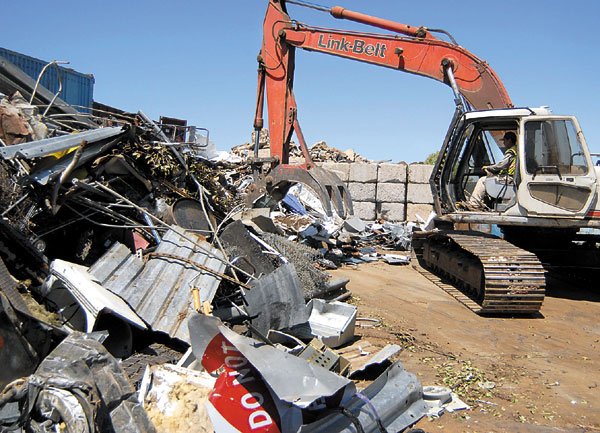Gilroy
– To stop thieves from reselling stolen metal, state legislators
want to impose new requirements on scrap-metal recyclers
Gilroy – To stop thieves from reselling stolen metal, state legislators want to impose new requirements on scrap-metal recyclers, who pay cash for pricey copper and aluminum. Recyclers say the proposed rules are impractical, but supporters argue that unless recyclers change their ways, thieves will keep reselling stolen metals, to the chagrin of farmers, builders, utility companies and the recyclers themselves.
When metal prices soared this year, thefts soared with them. Gilroy Police Sgt. Jim Gillio reported “a dramatic increase in recyclable thefts, particularly commercial thefts.” Pipes vanished from construction sites and rural fields; wire spools disappeared from utility yards. PG&E lost $1 million last year to stolen copper, said corporate security investigator Bob Puts.
“It’s an epidemic,” said Puts. “Even the recyclers try to get rid of [copper] as fast as possible – because they’re getting it stolen too.”
In Gilroy, Pacific Coast Recycling was victimized 10 times in nine months, according to CEO Carl Salinas, and has spent $20,000 for cameras to scan its yard. The expenses add to the business’ $30,000 loss in thefts. If the problem persists, said Salinas, he’s going to get a German Shepherd – maybe two.
“It seems like it’s just going to get worse,” said Salinas. “But the laws they’ve proposed – they wouldn’t work.”
A state bill introduced in February would require recyclers to “tag and hold” scrap metals for 15 days before releasing or disposing of them, and prohibit recyclers from paying cash. California law already requires scrap dealers to log sellers’ names, addresses, ID numbers, license plates and a description of the sold goods, said Steve Hirsch, director of state and local programs for the national Institute of Scrap Recycling Industries, Inc.
“If you clearly identify who is selling the material,” said Hirsch, “that’s one of the best things that can be done to reduce metal theft.”
To prevent abetting thieves, Pacific Coast requires that recyclers provide an ID, and keeps a file of recyclers’ information. Alarmed by copper thefts, the company won’t accept copper from sellers. Gilroy Detective Frank Bozzo has reached out to recyclers, checking that they’re complying with state law. PG&E has sponsored seminars in conjunction with law enforcement agencies, to explain the law to scrap companies. But not every recycler has followed the law, despite their efforts. In Gilroy, AMD Recycling on Howson Road only asks for ID on sales worth more than $50, according to owner Alex Dy.
That aggravates rural crimes deputy Gabe Sandoval, who says some recyclers haven’t been able to supply basic information on suspected thieves. Records are important because the goods themselves can be nearly indistinguishable, he said. Though some vendors mark their pipes, the markings can be cut off or sometimes obliterated. Some thieves strip insulation or coated wire down to the copper: a labor-intensive process that Puts links to methamphetamine use.
“Methamphetamine users stay awake long hours, and they’ve got to keep busy,” said Puts. “They think nothing of taking wire and stripping it all night.”
This spring, Gilroy police caught a would-be thief removing copper parts from air conditioning units on the roof of the old Wal-Mart building, said Gillio. The thieves themselves can be tough to prosecute, said Detective Dennis Moser, Santa Clara County Sheriff’s Office, unless police find them in the act.
“You have to catch them with the wire,” said Moser, “and that can be tricky.”
ISRI has opposed the “tag and hold” law, calling it impractical. Many recyclers receive hundreds of truckloads of metal a day, the vast majority of it legitimate, said Hirsch. Few have the acreage to keep scrap metals stored and segregated on their property. Hirsch added that metal prices fluctuate rapidly, and that delaying sales could prove expensive.
“If they’re buying it today, they want today’s price,” said Salinas. “If we have to sit on it for 30 days, we’ll have a price problem.”
Another state proposal, recently killed in a Senate committee, would require recyclers to fingerprint sellers and report their daily sales to the nearest Sheriff’s Office. Recyclers criticized the bill for criminalizing their trade, and the American Civil Liberties Union opposed it as an unnecessary invasion of privacy. Ultimately, the head of the Senate’s Public Safety Committee held it, saying that it could jail more people during a shortage of prison beds.
ISRI has promoted other solutions, such as a theft alerts system that faxes theft notifications to local recyclers, and approved a set of recommended practices for recyclers, including recording ID numbers, accepting checks or credit cards instead of cash, and refusing to accept likely-to-be-stolen items such as manhole covers or historical markers.
Locally, businesses have banded together to clamp down on theft. A rash of thefts galvanized one group of south Gilroy businesses to pay for private security patrols. Metal thieves broke into RMC Engineering almost every week before the business spent $540 per month to hire a guard and beefed up its locks, said spokesperson Shawna McKenzie: A single theft cost the company $28,000. McKenzie said Gilroy police have responded well, adding extra patrols to the area. Still, she said, “The PD is stretched pretty thin, and this just isn’t top priority – it’s not a violent crime.”
Though Puts works regularly with reputable scrap companies, he’s frustrated by the exceptions.
“Some recyclers just want to make the deal,” he said. “They say it’s not their job to be the police. But the law’s the law” – and the law, he noted, may be changing.















